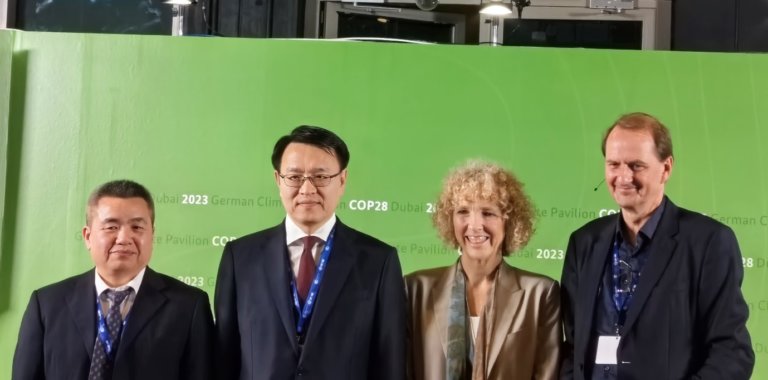Sustainable finance plays a key role in lowering greenhouse gas emissions and fostering climate-resilient development. To strengthen the implementation of sustainable finance, speakers from financial regulators, commercial and development banks, global initiatives, academia and think tanks, held an exchange in the kickoff workshop of the Sino-German Expert Dialogues on Sustainable Finance series on 14 March 2024. The event covered three thematic sessions, respectively on policy outlook and overall market development, green and sustainable finance taxonomy, and sustainability disclosure.
This event kicks off the workshop series hosted by IFS and Climate & Company, supported by GIZ China’s Climate Partnership project. It aims to enhance the exchange of technical insights and peer learning on different asset classes of sustainable finance products in the EU, German and Chinese markets.

Credit Photo: GIZ
Sustainable finance – rapid growth and pending challenges
Dr Ma Jun, the former Co-Chair of the G20 Sustainable Finance Working Group (SFWG) and the President of the Institute of Finance and Sustainability (IFS), a Beijing-based non-profit research institution, revealed insights on domestic and international progress in the field of sustainable finance. He emphasized China’s promising achievement in developing the world’s largest green loan and green bond markets during the last decade. Despite this progress, challenges persist, including the need for the nationwide implementation of the transition taxonomy, the development of risk analysis tools and ESG products for the asset management industry.
Following Dr Ma Jun, the latest updates on the overall policy development and market dynamics in China were shared by the representative of the Central Bank of China, the People’s Bank of China. In terms of green financial products, the balance of green loans in local and foreign currencies reached 30 trillion yuan (3.83 trillion EUR) at the end of 2023, an increase of 36.5% since the previous fiscal year. Green loans with direct and indirect carbon reduction benefits account for about two-thirds of all green loans given out by financial institutions in China. The green bond market stock is also growing, and the current outstanding stock is close to 2 trillion yuan (0.26 trillion EUR). Additionally, there are some innovative financial products such as sustainable development linked products, equity funds, insurance products, and carbon emission products.

Credit Photo: GIZ
The representatives of European-based organizations, including the Co-founder and CEO of Climate & Company Ingmar Jürgens, revealed during the workshop, that the EU sustainable finance regulatory framework is currently the most comprehensive one globally and continues to evolve. There is also significant development in FinTech, particularly around those ESG-focused companies. AI is being more frequently used to assist the data collection processes within financial institutions for disclosure and reporting. Emerging trends can be observed especially in areas of biodiversity finance, landscape financing, sustainable impact investing, and transition finance. These represent challenges but also areas of opportunity for financial institutions. Policy and regulatory developments continue to evolve very rapidly at both German and EU levels, aiming towards harmonization and streamlining of sustainable finance practices.
The application and further promotion of the EU-China Common Ground Taxonomy (CGT) was spotlighted at the meeting. To date, the CGT has resulted in the labelling of 221 green bonds, accounting for 22% of the total amount of green bonds in China. The IPSF taxonomy group SGWG, chaired by China, has been instrumental in developing the CGT, which includes 72 financial activities that significantly contribute to climate change mitigation. During the labelling exercise, some challenges were identified. One major issue is the limited proportion of overseas institutions investing in Chinese green bonds due to non-uniform green standards and the low degree of interoperability. The second phase of work under the International Platform on Sustainable Finance (IPSF) taxonomy group is currently underway, focusing on expanding the comparison exercise to other jurisdictions, upgrading the current methodology, and conducting knowledge-sharing events to disseminate information about the CGT.

Credit Photo: GIZ
Further workshop discussions focused on the trends towards the broader use of global standards and the need to ensure interoperability of standards. The G20 debate about adopting sustainability disclosure requirements was highlighted. It was noted that while some countries have started requiring larger companies to adopt these standards, emerging markets have expressed concerns, especially for small and medium-sized firms where resources for such disclosure might be less readily available. Corporations are, furthermore, facing an information overload due to inconsistency among diverse disclosure standards. Aligning these standards will enhance market integrity and investor confidence.

Credit Photo: GIZ
This kick-off event marked the beginning of a series of workshops planned for 2024. It provided a platform of exchange between more than 40 Chinese and German experts, practitioners, and policymakers who discussed technical approaches on how to make finance flows consistent with a pathway towards low greenhouse gas emissions and climate-resilient development. Upcoming workshops in 2024 will focus on debt-based products, equity-based products, insurance and FinTech.



